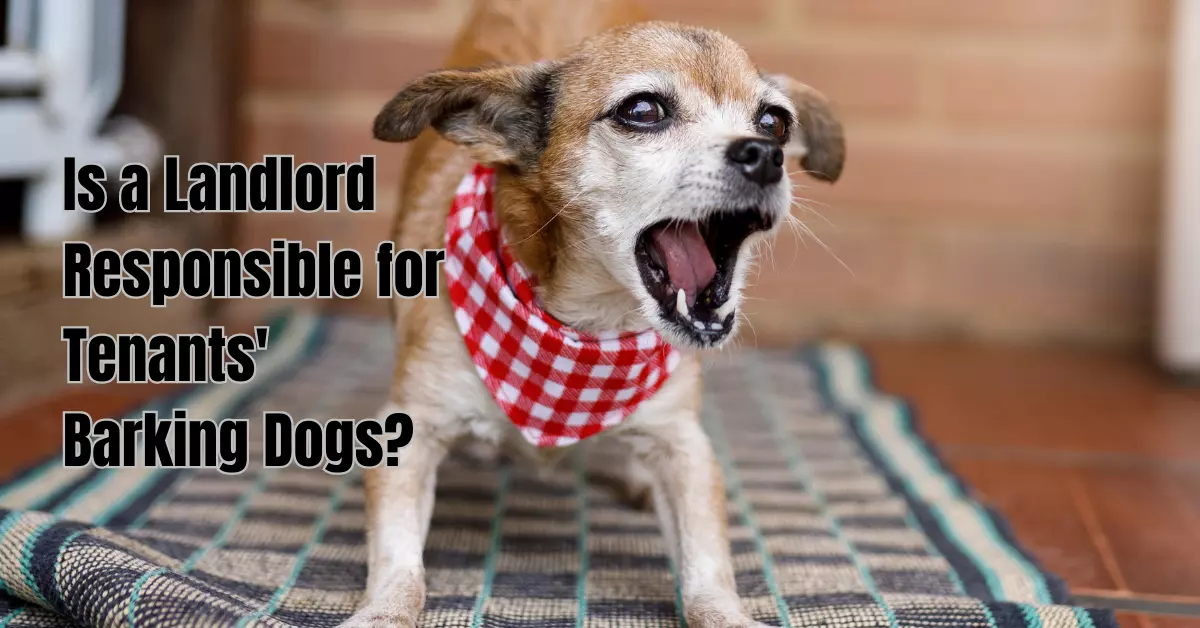Is a Landlord Responsible for Tenants’ Barking Dogs?
A landlord may be responsible for a tenant’s barking dog. It depends on the terms of the lease agreement and local laws.
If a landlord allows tenants to have pets, they may be responsible for excessive noise and disturbances caused by the pets. This can include barking dogs, which can be a nuisance to other tenants or neighbors.
However, if the lease agreement prohibits pets or requires tenants to keep their pets quiet, the responsibility falls on the tenant.
If a tenant’s barking dog is causing issues, the landlord may need to take action to resolve the situation, such as through mediation or legal action.

Understanding The Law: Liability For Pet-Related Incidents
Owning a pet can be an enjoyable and rewarding experience, but it can also come with its fair share of legal implications. As a landlord, it begs the question: if a tenant’s pet causes damage or injury, am I held accountable?
It is important to understand the laws governing landlord-tenant relationships and liability when it comes to pet-related incidents. Here are some key points to consider:
Definition Of Landlord-Tenant Law
- Landlord-tenant law is a set of regulations that governs the relationship between a landlord and their tenants.
- This law outlines the rights and responsibilities of both parties, including the landlord’s obligation to provide a safe and habitable environment for their tenants.
Legal Responsibility For Pets In Rental Properties
- In most cases, landlords are not held responsible for a tenant’s pet unless the pet has caused damage or injury due to a pre-existing issue with the property.
- Landlords may be liable, however, if they were aware of a dangerous pet on the property and failed to take action.
- It is important for landlords to include pet policies and rules in the lease agreement as a preventative measure.
Examples Of Cases Where Landlords Were Held Responsible For Tenant’S Pets
Here are some examples of cases where landlords have been held accountable for pet-related incidents:
- A landlord was held liable when a tenant’s dog attacked a visitor on the property, as the landlord knew the dog had a history of aggression.
- One landlord was found responsible for damages caused by a tenant’s cat, as they failed to disclose that the property was infested with fleas.
- In another case, a landlord was held responsible for injuries sustained when a tenant’s large dog knocked down a visitor.
Assessing The Landlord’S Responsibility

The Landlord’S Obligations Under The Law
As a landlord, it’s essential to be familiar with the laws and regulations about pets and noise in your area.
These regulations vary depending on the city or state, and a landlord’s obligations may differ. You must understand your obligations as a landlord to avoid any legal problems.
As a landlord, your general obligation requires you to provide tenants with peaceful and quiet enjoyment of the rental property.
If the barking dog is disturbing the tenant’s right to enjoy their property quietly, you may be held accountable.
Landlord’S Responsibilities When It Comes To Barking Dogs
A landlord may not be accountable for a tenant’s barking dog. But they have a duty of care to the other tenants, neighbors, and the community to maintain a peaceful environment.
Here is what you need to consider as a landlord when it comes to barking dogs:
- The lease agreement should be clear about any restrictions on pets, including barking dogs.
- A landlord may require a tenant to remove a pet that causes excessive noise or other nuisances that interfere with the quiet enjoyment of other tenants.
- If a landlord is aware of a barking dog issue, they can work with the tenant to address the problem, including training, exercise, or behavioral modifications.
- A well-crafted pet policy in the lease agreement can assist in outlining the landlord’s expectations and what will happen if the tenant does not comply.
Steps A Landlord Can Take To Address A Barking Dog
Landlords must take appropriate measures to address barking dogs that create discomfort to other tenants. Here are some of the steps landlords can take:
- Communicate with the tenant in writing to address the issue and provide specific dates to address the problem.
- Conduct a verbal or written warning notice explaining to the tenant the problem with the barking dog.
- Provide a notice to comply or quit if the issue continues without being resolved.
- Involve animal control or local authorities to fix the dog’s barking problem.
- If encountering an uncooperative tenant, a landlord may file for eviction.
Tenant’S Responsibility And Solutions
It is the responsibility of the tenant with a barking dog to take suitable actions and ensure that the noise does not disturb their neighbors or violate any regulations. Tenants have to make sure their pets have enough food, water, and attention.
Getting your neighbors to sign off on an agreement about your pet’s barking could be a good idea. This will help assure the landlord that other residents are not being disturbed.
Discussion Of Training And Deterrents
Tenants might choose to hire professional trainers to tackle barking concerns. Alternatively, they may use deterrents such as vibrating collars that use sound or motion to inform the dog when it’s making too much noise. Citronella collars can also be creative.
They can keep a barking dog quiet while also deterring those who approach the animal.

Legal Options For Landlords With Uncooperative Tenants
When a tenant is uncooperative, documenting undesirable behavior can aid in obtaining an eviction order. The landlord must demonstrate that they’ve made reasonable efforts to engage with the occupant and solve the issue. Landlords should provide written warnings, with everything in writing.
It is essential to notify the tenant, preferably in writing, of the issue and warn them of the consequences if it isn’t resolved, and more formal action is required.
FAQs about is a landlord responsible for tenants’ barking dogs?
Can A Landlord Prohibit Barking Dogs In The Rental Agreement?
Yes, landlords can prohibit barking dogs in the rental agreement if it is clearly stated.
Is A Landlord Responsible For A Tenant’S Noisy Pet?
Generally, landlords cannot be held responsible for tenants’ noisy pets, but they can take legal action.
Can A Landlord Evict A Tenant For A Barking Dog?
Yes, a landlord can evict a tenant for a barking dog if it breaches the rental agreement or disturbs other tenants.
What Can A Tenant Do If Their Landlord Doesn’t Take Action Against A Barking Dog?
The tenant can file a complaint to local authorities or seek help from an attorney specializing in landlord-tenant law.
Conclusion
Finding peace in your apartment shouldn’t be disrupted by a barking dog next door. As a tenant, you need to know that landlords generally aren’t responsible for these noise complaints.
You, however, hold the power to initiate communication, diplomatically addressing the issue with your neighbor or taking it up with local noise control.
Reference
https://www.humanesociety.org/resources/information-renters-pets